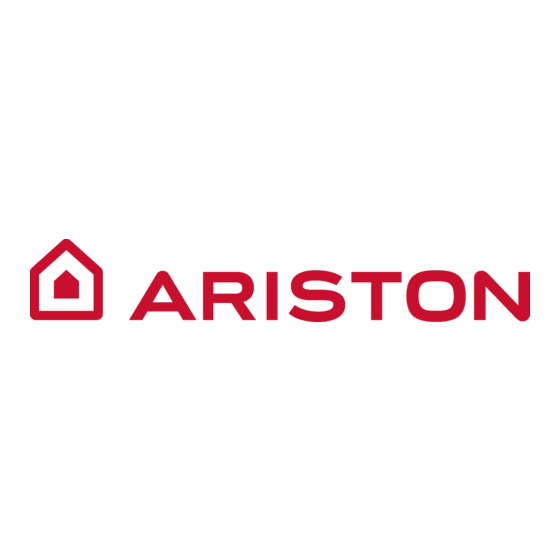Ariston EuroCombi Type C A27 MFFI Manuale di istruzioni per l'installazione - Pagina 20
Sfoglia online o scarica il pdf Manuale di istruzioni per l'installazione per Caldaia Ariston EuroCombi Type C A27 MFFI. Ariston EuroCombi Type C A27 MFFI 24. Type c boiler
Anche per Ariston EuroCombi Type C A27 MFFI: Manuale di istruzioni per l'installazione (28 pagine), Istruzioni per la manutenzione (32 pagine), Istruzioni per la manutenzione (32 pagine), Istruzioni per la manutenzione (32 pagine)

3.7
Fume Discharge
Monitoring
3.8
Boiler Safety Systems
3.9
Draining the System
20
Supplied By www.heating spares.co Tel. 0161 620 6677
The discharge/ventilation of the exhaust fumes can be monitored to check for
losses in general pressure in the system. This is done to eliminate the cause of
lighting failure with the main burner not indicated by a shutdown status.
With a differential manometer connected to the test socket
on the combustion chamber, the DP value for the air pres-
sure switch can be taken. The measured value should not
be less than 10 mbar under maximum thermal power condi-
tions (with the knob "C" on the flue test setting) in order for
the unit to function properly and without interruption.
The boiler is equipped with the following safety systems (see section 3.3 for references):
1 - Ignition Failure
This control signals an ignition failure on the burner 7 seconds after a lighting failure.
The L.E.D. "B".will turn on to signal the shutdown status.
The system can be reset by pressing and releasing the button "A" after checking to
make sure that the gas valve is open. Repeat this process until the burner lights.
2 - Circulation Failure
This control signals that the safety pressure switch on the primary circuit has not
sensed a pressure of at least 1 bar within 40 seconds of the activation of the circulation
pump, it shuts off the boiler and lights the L.E.D. "D". The system can be reset (after the
pressure has been brought up to the proper level) by using the On/Off switch "L".
3 - Overheating
This control shuts off the boiler in the case where the primary circuit reaches a tempera-
ture in excess of 110°C. The L.E.D. "G" will come on to signal this shut off status. After the
system has been allowed to cool, the system can be reset by pressing the button "A".
4 - The boiler is provided with a device that, should the temperature of the water for the
heating system fall to below 3°C, is activated until a temperature of 55°C is reached
(still for heating purposes).
This device can only be activated with a perfectly operating boiler:
- The pressure of the system is sufficient,
- The boiler is well supplied electronically,
- The gas is supplied.
5- Limescale Build-up
This is an indirect control (actuated through the regulation of the temperature in the
primary heat exchanger) on the formation of limescale in the secondary heat
exchanger. Regardless of the flow rate and the temperature in the circuit for the
domestic hot water, the temperature is limited to 62°C.
6- Safety Shut-off
At the start of every lighting phase, the P.C.B. performs a series of internal controls. If
a malfunction occurs, the boiler will shutdown until the problem has been resolved.
Draining the heating system.
The heating system must be emptied as follows:
- Turn off the boiler;
- Open the drain valve for the system and place a container below to catch the
water that comes out;
- Empty the system at the lowest points (where present). If you plan on not
using the heating system for an extended period of time, it is recommended
that you add antifreeze with an ethylene glycol base to the water in the
heating lines and radiators if the ambient temperature drops below 0°C during
the winter.
This makes repeated draining of the entire system unnecessary.
Draining the domestic hot water system.
Whenever there is the danger of the temperature dropping below the freezing
point, the domestic hot water system must be drained as follows:
- Turn off the general water valve for the household plumbing system;
- Turn on all the hot and cold water taps;
- Empty the remaining water from the lowest points in the system (where
present).
